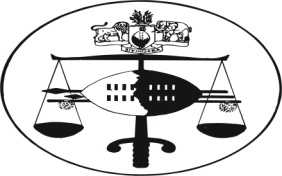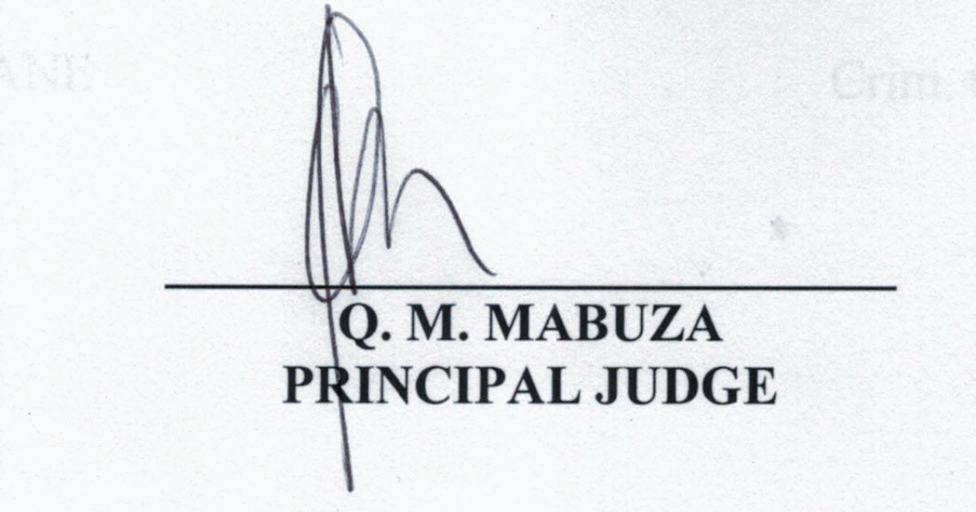
IN THE HIGH COURT OF SWAZILAND
HELD AT MBABANE CASE NO. 1017/2016
In the matter between:
NGILOZI ALEX MASILELA APPLICANT
and
NHLANGUYAVUKA FARMERS ASSOCIATION 1ST RESPONDENT
NORMAN MCUYI MASILELA 2ND RESPONDENT
Neutral Citation : Ngilozi Alex Masilela vs Nhlanguyavuka Farmers
Association & Norman Mcuyi Masilela (1017/2016) [2017] SZHC 172 (17 AUGUST 2017)
Coram : MABUZA - PJ
Heard : 24/3/2017
Delivered : 17 AUGUST 2017
SUMMARY
Civil Procedure – Application for mandatory Interdict – Applicant has failed to prove jurisdiction – Application fraught with material disputes of fact – Applicant has failed to satisfy the requirements of an interdict – Application dismissed with costs.
JUDGMENT
MABUZA -PJ
[1] The Applicant herein seeks the following:
That the Respondent be ordered to register the Applicant and
cause him to be member who share profits in its business of sugar cane production.
That the Respondent be directed to ensure that the Applicant
Ngilozi Alex Masilela share in the next distribution of dividends for members of the Respondent.
That the Respondent pays costs of this application at an attorney
and own-client scale.
Granting the Applicant any further and/or alternative relief as
this Honourable Court deems fit.
[2] The Applicant is a Swazi adult male and a resident of Nhlanguyavuka area in the Hhohho Region.
[3] The 1st Respondent is Nhlanguyavuka Farmers Association, a legal person formed to conduct a business of sugar cane production, having the capacity to sue and to be sued in its own name; with its principal place of business at Nhlanguyavuka area, Mhlangatane Inkhundla, in the Hhohho district.
[4] The 2nd Respondent is Norman Mcuyi Masilela an adult Swazi male of Nhlanguyavuka area under Bulandzeni Umphakatsi Mhlangatane Inkhundla in the Hhohho Region.
[5] The facts hereto are that during the year 1999, Swaziland Water Development Enterprise (SWADE) introduced the cultivation of sugar cane at Nhlanguyavuka area in the Hhohho Region.
[6] The 1st Respondent was formed with the purpose of embarking on a sugar cane production project. It took over fields which belonged to residents of Nhlanguyavuka for the sugar cane venture.
[7] One of the fields taken over for this scheme belonged to Baleza Masilela who became a member of the 1st Respondent.
[8] Baleza had two wives namely, Lomadamu Ntiwane and Lomapulazi Myaba. The Applicant and 2nd Respondent are siblings born of LaNtiwane. The 2nd
Respondent is the elder sibling. LaMyaba did not have children.
[9] At the time of distribution of dividends from the proceeds of the sugar cane Baleza had died and his first wife LaNtiwane joined the 1st Respondent as a member. LaMyaba joined later after the 2nd Respondent had identified a field within its ploughing radius as belonging to her and the Royal Kraal ordered the 1st Respondent to allow her to join as a member as she had paid the joining fee. Both wives later died.
[10] The Applicant says that he was nominated by the family to replace LaMyaba as a member of the 1st Respondent and to this end has filed “Angel 1” which is a letter from the family confirming his nomination but the latter is refusing to have him registered as a member.
[11] The 1st Respondent denies that it has refused to register the Applicant. It says that it cannot register the Applicant as a member because the 2nd Respondent has continually objected to such registration.
[12] Having gone through all sets of affidavits I am of the view that:
(a) This matter is fraught with material disputes of fact which cannot
be properly resolved on affidavits.
(b) The Applicant has not exhausted local remedies. Annexure “NHS” which is a letter from the Bulandzeni Royal Kraal clearly states that the matter is pending before them. As the Applicant’s family did not report back to them on the development of the matter as ordered.
(c) Consequently this Court has no jurisdiction to entertain the matter.
Non-joinder of the Master of the High Court.
[13] The Applicant is also relying on a directive from the Master of the High Court to which the 2nd Respondent lodged an objection which has not been deliberated upon. The response of the Applicant with regard to non-joinder of the Master of the High Court is set out at paragraph 8 of his supplementary heads as follows:
“8.1 The 2nd Respondent has raised the point that the Master of the High Court ought to have been joined in the proceedings.
8.2 It is trite law that; a party in order to be considered a necessary party to proceedings, that party must have a direct and substantial interest in the subject matter of the litigation.
8.3 The only reason the 2nd Respondents has raised the point of non-joinder is that; the Applicant is relying on a document from the Master, therefore the Master ought to have been joined in the proceedings. That is not what the law requires.
8.4 In Bilal Investments (Pty) Ltd v GS Traders t/a Ladies and Gents Fashions and Others: Supreme Court Civil Appeal No. 17/2016 it was held that, “It is settled law that the right of a defendant to demand the joinder of another party and the duty of the Court to order such joinder or to ensure that there is a waiver of the right to be joined (and this right and this duty appear to be co-extensive) are limited to cases of joint owners, joint contractors and partners and where the other party has a direct and substantial interest in the issues involved and the order which the Court might make (See Amalgamated Engineering Union v Minister of Labour, 1949 (3) SA 637 (AD); Koch and Schmidt v Alma Modehuis (Edms) Bpk., 1959 (3) SA 308 (AD). In Henri Viljoen (Pty) Ltd v Awerbuch Brothers, 1953 (2) SA 151 (O), HORWITZ AJP (with whom VAN Blerk, J, concurred) analysed the concept of such a “direct and substantial interest” and after an exhaustive review of the authorities came to the conclusion that it connoted (see p. 169) – ”… an interest in the right which is the subject-matter of the litigation and not … merely a financial interest which is only an indirect interest in such litigation.”
8.5 It is clear that the Master of the High Court has no direct and substantial interest in the right which is the subject matter of the litigation.”
[14] I agree with the Applicant’s submission however in estate matters before this Court Rule 6 (23) provides as follows:
“A copy of every application to court in connection with the estate of a deceased person … shall, before such application is filed with the Registrar, be submitted to the Master for consideration and report…”
[15] It is clear to me that the Masters input was essential herein as the Applicant seeks relief from this Court with regard to an estate or benefit accruing to a deceased person, LaMyaba.
Failure to satisfy the requirements of an interdict.
[16] In casu it is clear that the Applicant seeks a mandatory interdict against the 1st Respondent which is final in nature. In order to succeed the Applicant must show that; he has a clear right; there is imminent or continuing violation of a right, there is no alternative satisfactory remedy available to him and that the balance of convenience favours him.
See Roots Civils (Pty) Ltd v Chairman of the Tender Board and 12 Others: High Court Civil Case No. 892/2014 it was held by MCB Maphalala J that; “Herbstein & Van Winsen’ deals with the requirements of an interdict as follows: “In order to succeed in obtaining a final interdict, whether it be prohibitory or mandatory, an applicant must establish:
a) a clear right”
b) an injury actually committed or reasonably apprehended;
c) the absence of similar or adequate protection by any other remedy”
See: Tsabedze & 45 Others v SNPT & 4 Others: Supreme Court Case No. 26/2011.
[17] In detailing the evidence tendered by him the Applicant has failed to factor in the objection by the 2nd Respondent who has also claimed the right in dispute. The requirements of a clear right are set out in the classic case of Setlogelo v Setlogelo 1914 AD 221 at 277.
See also MPD Marketing Suppliers (Pty) Ltd v Roots Construction (Pty) Ltd & Another (2709/09) [2002 SZHC].
[18] In light of the material disputes of fact, it is evident that the Applicant has failed to establish a clear right for an interdict.
[19] In light of all the foregoing it follows that the application must fail. It is accordingly dismissed with costs.

For the Applicant : Mr. Gumedze
For the Respondent : Mr. S.K. Dlamini
9